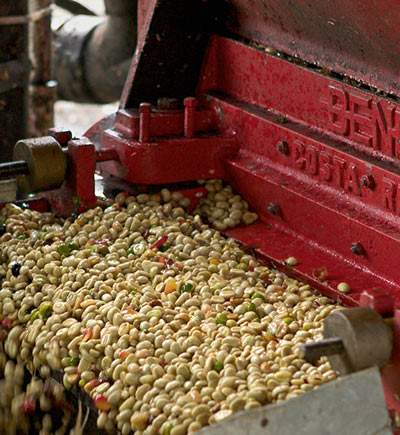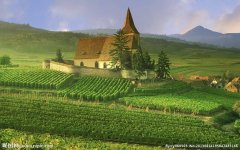Sustainable Development Strategy of Ramla and Hartman, Gerisha Manor in Panama
For professional baristas, please follow the coffee workshop (Wechat official account cafe_style)

Although La Mula does not have any official certification, from an environmental and social point of view, the farm is designed as a model of sustainable development. The agricultural philosophy originally designed finally became the guiding ideology of agricultural development and agricultural management.
Despite the potential benefits of being certified as a farm, Finca La Mula management has implemented a system of sustainable practices that far exceeds the goals of all certification models.
Thanks to the combination of Willem Boot and Kelly Hartmann concepts, La Mula has become a sustainable farm that aims to produce coffee in harmony with the surrounding rainforest, ensuring that agricultural activities have a minimal impact on forest biodiversity, including native tree diversity, diverse wildlife and extremely rich soil, as well as active microbacterial populations.
As initially foreseen, the focus is on reducing input to an absolute minimum.
Farm policy forbids the use of herbicides and pesticides. Mild, biodegradable fungicides are used only in extreme cases, when there is an active fungal attack (which occurs once in the history of the farm).

The Agricultural philosophy of Ramla Manor
In his early career as a buyer of coffee for a Dutch family baking company, William noticed the adverse effects of coffee cultivation on the environment. He saw farms with high-yielding coffee trees in countries such as Colombia and Costa Rica, and he was shocked by the sterile environment of these open-air plantations. Leaving coffee trees depends on large amounts of agrochemicals, and there is no room for insects and birds to breathe.
In Panama, also known for its natural wealth, William observed that the impact of coffee cultivation and the heavy use of harmful herbicides such as glyphosate in well-known areas such as Boquete Valley depleted the vitality of the soil to some extent.
When he made up his mind to become a farmer, he decided to establish an "out-of-the-box" way of farming, looking for land outside the Boquete area and near Volcan Baru National Park. When William first visited his farm in 2006, he relied on a mule to explore the rugged terrain of Mount Baru. On the southeast slope of the 3500-meter-high Balu volcano, he found a small abandoned farm with coffee trees covered with weeds and surrounded by the most beautiful native trees he had ever seen. This experience made him fall in love with the land, its magnificent scenery and the beauty of nearby clouds.
The idea of Finca La Mula ("mule") was conceived during the same visit. Ramla cultivation began in 2006 and ended in 2007. After weeding, the old trees are uprooted and the hanging trees are carefully pruned to increase the light on the farm.
To prevent soil erosion, special deep-rooted My trees are planted on the farm to provide more stability for the soil.
6500 coffee trees are planted with large distances to prevent long-term soil depletion and to allow coffee trees to integrate with the forests that protect them.
Deliberately decided to maintain the relative seclusion of the farm and not to add more roads to the farm. There are two ways to get to Lamura; either walk from a nearby farm or need a small 4x4, which requires an experienced driver.

Price transparency of sustainable development
La Mula coffee is served directly by farmer and producer Willem Boot. There are no middlemen or other trading partners involved in the transaction. Price premiums are allocated to important reasons, such as environmental protection, workers' living conditions and other important sustainability conditions.
The supply of Finca La Mula coffee is limited because of the size of the farm. Finca La Mula is a commercial and agricultural model for specialty coffee farmers who want to produce super specialty coffee in an ecologically and socially sustainable way.
Farm worker
Finca La Mula employs two permanent workers: Francisco and Leonardo. They have worked at La Mula for more than five years. In 2011, a staff farmhouse was built for employees. In 2014, solar panels were installed in electrical systems and televisions. In 2011, a specially designed energy-saving Onyl furnace was installed to minimize the use of firewood. La Mula management already produces beans, corn and vegetables on farm land. In addition to long-term workers, as many as eight seasonal workers harvest cherries. These temporary employees usually live in the nearby town of Portrerillas.
Finca La Mula pays workers more than the Panamanian minimum wage, including medical insurance. For quality, seasonal workers charge a premium of up to 200% for ripe cherries-premiums that can amount to a significant increase in workers' net income.
Agricultural practice
Although La Mula does not have certified organic farms, farms use typical practices to reduce the impact on the environment by restricting the use of agrochemicals. In addition, Ramra's management made soil conversation a top priority. Mulching and composting techniques have been implemented to maintain the unique soil composition of the farm.
Rain forest
The farm is dotted with primary and secondary old growing trees. Finkamula is a haven for more than 160 species of migratory birds, many mammals (including jaguars or leopards), all types of snakes and incredible insects.
The La Mula flora includes impressive wild orchids and native ferns.
Save water
Lamura's conservation plan involves pumping water from springs in nearby cloud forests. Strong shadows keep the ground moist and do not require irrigation. At present, about 70% of coffee is processed by dry natural processing that does not require any water. The remaining 30 per cent of the harvest is processed using traditional fermentation techniques outside the Hartmann family factory. To this end, the Hartman family has established an ingenious system to recycle and filter waste water and prevent pollution from logistics.
Organic and conventional fertilizers
To build and maintain the productivity of coffee trees, Finca La Mula uses a combination of organic and conventional fertilizers.
At least once a year, about 1 pound of organic "bokashi" compost is applied to each tree.
Workers apply for traditional NKP (nitrogen, phosphorus and potassium) fertilizer three times a year.
In addition, La Mula's annual practice includes the application of up to 2 leaves of biodegradable fertilizers such as calcium, zinc and boron.
The management of La Mula is currently evaluating the use of natural fertilizers as an alternative to traditional fertilizers.
Biodegradable fungicides
In special cases, low-impact fungicides are used to prevent the spread of invasive fungi called "Ojo De Gallo" without biological agents.
So far, there has been only one outbreak of the fungus.
Fortunately, geisha trees are highly resistant to Roya (leaf rust) fungi, so La Mula does not need to deal with this natural threat.
Recycling practice
Plastic and paper are collected centrally and recycled; compostable materials are made into composting.
Important Notice :
前街咖啡 FrontStreet Coffee has moved to new addredd:
FrontStreet Coffee Address: 315,Donghua East Road,GuangZhou
Tel:020 38364473
- Prev

La Mula Ramra Manor in Panama introduces the small geisha estate next to Hartman.
Professional baristas please follow the coffee shop (Wechat official account cafe_style) geisha, Ramla manor owner Willem Boot: it was love at first sight. In 2004, I was fascinated by a geisha on an extraordinary day, and my life has changed ever since. At that time, I participated as a cup test judge during the Panamanian coffee competition.
- Next

Introduction to Panama Berlina Estate Solar Geisha
For the exchange of professional baristas, please follow the coffee workshop (Wechat official account cafe_style) basic information farm: BerlinaEstate breed: Geixia geisha / rose summer treatment: sun treatment altitude: 1500-1700 m above sea level owner: Casa Ruiz,SA town / city: Horqueta,Boquete area: Chiriki BerlinaEstate sun rose summer-
Related
- Does Rose Summer choose Blue, Green or Red? Detailed explanation of Rose Summer Coffee plots and Classification in Panamanian Jade Manor
- What is the difference between the origin, producing area, processing plant, cooperative and manor of coffee beans?
- How fine does the espresso powder fit? how to grind the espresso?
- Sca coffee roasting degree color card coffee roasting degree 8 roasting color values what do you mean?
- The practice of lattes: how to make lattes at home
- Introduction to Indonesian Fine Coffee beans-- Java Coffee producing area of Indonesian Arabica Coffee
- How much will the flavor of light and medium roasted rose summer be expressed? What baking level is rose summer suitable for?
- Introduction to the characteristics of washing, sun-drying or wet-planing coffee commonly used in Mantenin, Indonesia
- Price characteristics of Arabica Coffee Bean Starbucks introduction to Manning Coffee Bean Taste producing area Variety Manor
- What is the authentic Yega flavor? What are the flavor characteristics of the really excellent Yejasuffi coffee beans?

